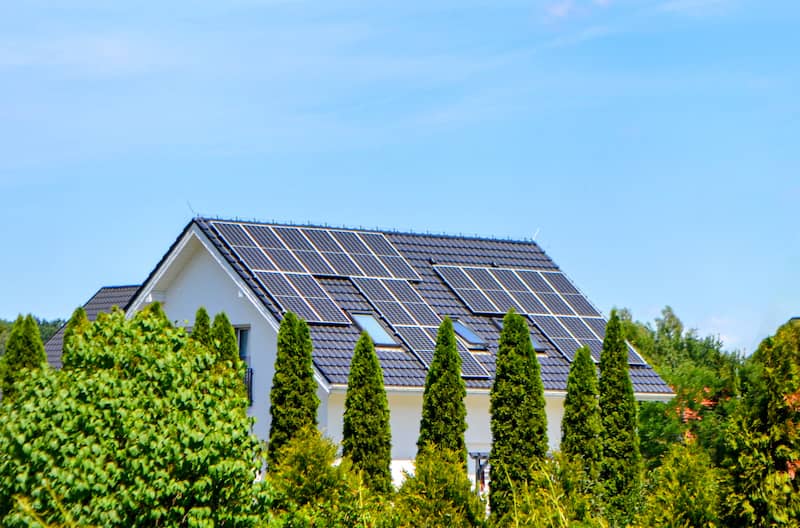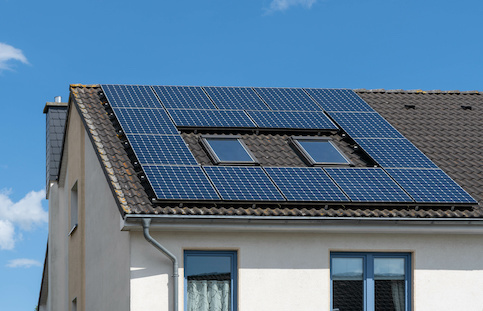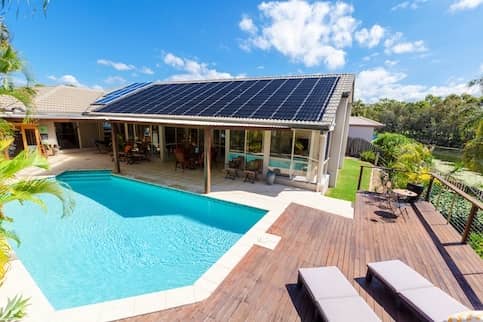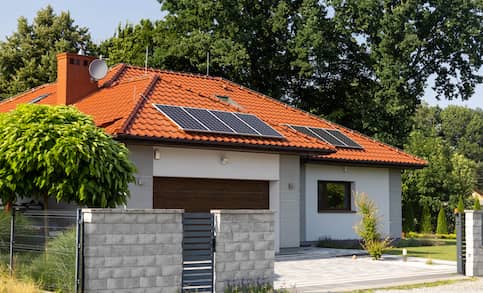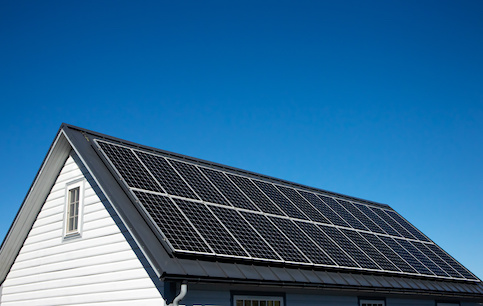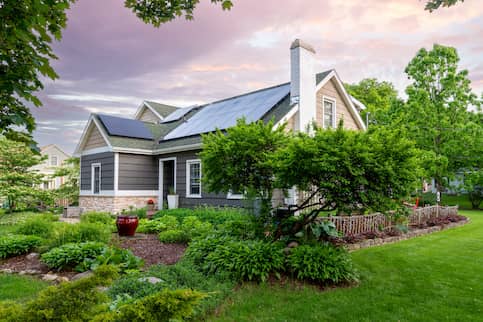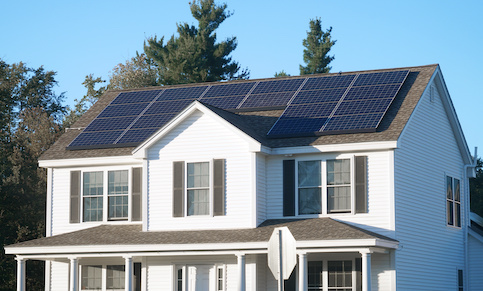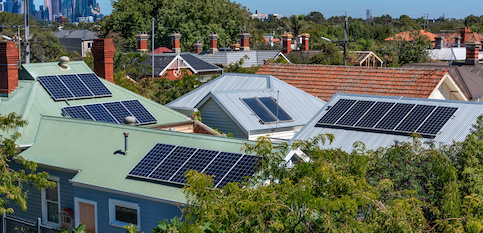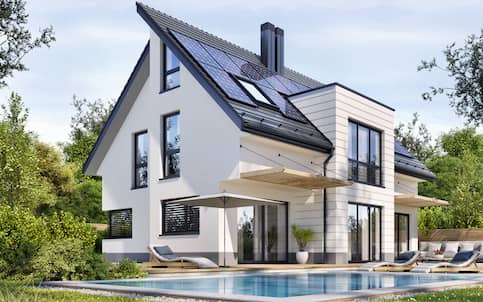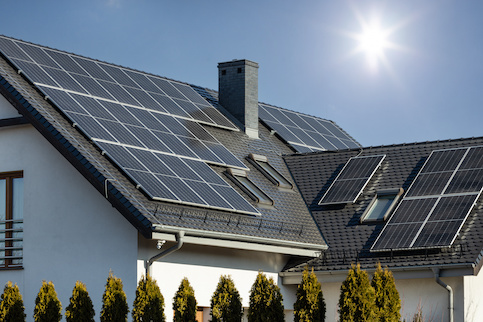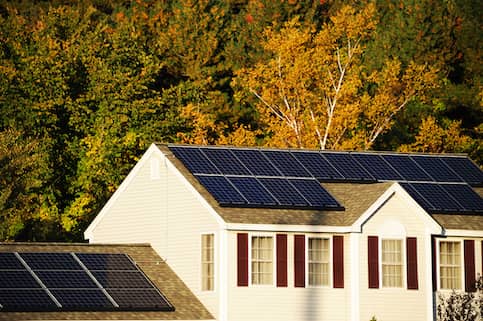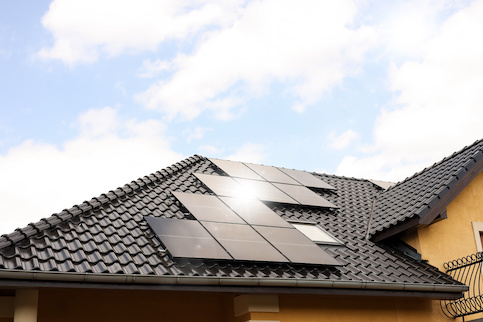Installing solar panels is an excellent way to improve your home’s value, lower your energy costs and reduce your carbon footprint. But solar installations come with hefty costs. According to EnergySage, you can expect to pay an average of $22,022 – and that’s after applying federal tax credits.
If you can’t afford to pay this out of pocket, solar financing can help you break up these costs. Knowing how solar financing works and what the various options are will help you determine what makes sense for your situation.
What Is Solar Financing?
Solar financing is a way for homeowners to get solar panels without paying out of pocket upfront. There are various solar financing options you can choose from, including loans for solar panels and contractor financing.
Some homeowners may consider leasing solar panels. Leasing allows you to enjoy the benefits of solar panels without the high upfront costs. However, buying solar panels is the best option since you may qualify for various tax incentives or credits and save more money over time.
What’s Your Goal?
Buy A Home
Discover mortgage options that fit your unique financial needs.

Refinance
Refinance your mortgage to have more money for what matters.
Tap Into Equity
Use your home’s equity and unlock cash to achieve your goals.
How Does Solar Financing Work?
After you take out a loan to finance your solar ambitions, you’ll begin repaying it monthly with interest. Most solar loans don’t have any down payment requirements and typically come with 8-to-20-year repayment terms.
Borrowers with excellent credit will qualify for the best rates and terms. To qualify, you’ll need a minimum 650 FICO score and a debt-to-income ratio below 50%. The primary borrower’s name also must be listed on the home’s title.
Ready To Refinance?
Get matched with a lender that can help you reach your financial goals.
Types Of Solar Financing
When it comes to financing solar panels, homeowners have many different options to pick from, each with its own set of pros and cons.
Solar Loans
Solar loans are personal loans used to purchase solar panels. Solar loans come with fixed interest rates, so your monthly payments won’t change over the life of the loan. And personal loans tend to offer fast funding.
Pros
- You’ll receive fixed interest rates, so your monthly payments won’t change.
- These loans are secured by the solar panels, so you won’t have to use your home or car as collateral.
- Personal loans are easy to apply for and you can receive fast funding.
Cons
- You’ll need a FICO score above 720 to qualify for the lowest interest rates and longer credit terms.
Solar Leases And Power Purchase Agreements
A solar lease is similar to a solar loan since it involves making monthly payments with interest. However, when you take out a solar lease, the solar company still owns the equipment and allows you to use it for a period of time.
If you opt for a power purchase agreement, your payments are based on a specific price per kilowatt-hour of solar energy generated.
Pros
- You can rent the solar panels and use the equipment for no money down.
- The solar company is responsible for any ongoing system maintenance.
- This is a good option for anyone having a hard time taking out a solar loan.
Cons
- Since you don’t own the panels, you can’t claim the full tax credit.
- You’ll pay less upfront but may have higher costs in the long term.
- If you need to end your lease early, you may get hit with early termination fees.
Contractor Financing For Solar Loans
Many solar companies offer financing for their solar systems through a third-party lender. These loans usually come with 10-to-25-year repayment terms, and may be more flexible than other forms of financing.
Pros
- It may be easier to qualify for contractor financing.
- Contractor financing can simplify the process for homeowners.
Cons
- Since the payment terms are longer, you’ll end up paying more interest over the life of the loan.
- These loans may come with additional fees.
Home Equity Loans And Lines Of Credit
Another option is to use the equity in your home to purchase solar panels. You can do this by taking out a home equity loan or home equity line of credit.
Home equity loans come with fixed interest rates and consistent monthly payments. A HELOC gives you access to a line of credit you can draw from as needed. It comes with variable interest rates, so your payments will fluctuate depending on how much credit you access.
Pros
- These loans often come with low interest rates.
- Can be a good option for homeowners with lots of equity built up.
- You can use any additional funds for home improvements.
Cons
- If you default on the loan, you could end up losing your home.
- You can only borrow up to 85% of your home’s value.
- The application process is more involved than other types of loans.
FHA 203(k) Loan
An FHA 203(k) loan is backed by the Federal Housing Administration and intended for home buyers. It allows you to buy your home and finance home improvements, like solar panels. These loans come with low down payment requirements and flexible credit requirements.
Pros
- Gives buyers an option to finance their solar panels while purchasing their home.
- FHA 203(k) loans have low down payment requirements.
- May be a good option for borrowers with bad credit.
Cons
- By lumping the two purchases together, you’re putting your home at risk.
Cash-Out Refinance
A cash-out refinance is another way to finance solar panels using the equity in your home. This works by refinancing your home for more than you currently owe on the mortgage. You’ll receive the difference in cash, and you can use these funds to pay for solar panels and other home improvement projects.
Pros
- Allows you to use your home equity to finance the purchase.
- You’ll receive the cash directly, so you have the freedom to spend the money however you want.
- This gives you an opportunity to lower the interest rates on your mortgage.
Cons
- Since you’re taking out a new mortgage, you’ll have to pay closing costs, which typically cost 2% to 6% of the total loan amount.
View Your Refinancing Options
Find a refinance lender that will work with your unique financial situation.
Solar Panel Tax Benefits
There are various local, state and federal tax credits available to homeowners who purchase solar panels. One of the best options available is from the Inflation Reduction Act. It provides a 30% tax credit if you purchase and install a solar panel system through 2032.
And, depending on where you live, you may qualify for additional state and local tax benefits. The Database of State Incentives for Renewables & Efficiency can help you find more information on state benefits.
How To Get A Solar Loan
If you’re interested in taking out a solar loan, you’ll start by researching different lenders. Banks, credit unions, online lenders and solar companies all offer various lending options to homeowners. As you shop around, compare the interest rates, fees and repayment terms that come with the loan.
Check to ensure that you meet the lender’s eligibility requirements before applying. For example, some lenders may have specific credit requirements you need to meet.
If you’re having a hard time qualifying for solar financing, applying with a creditworthy co-signer can improve your odds. If that isn’t an option, you may want to spend time paying down debt and improving your credit score before reapplying.
Solar Panel Financing FAQ
Financing solar panels is a big commitment, so you may have additional questions about how the process works. If you still have more questions than answers, you may find the following information helpful.
The Bottom Line
Solar financing allows you to enjoy the benefits of solar panels without the high upfront costs. Before moving forward, it’s a good idea to research lenders and compare your options.

Jamie Johnson
Jamie Johnson is a Kansas City-based freelance writer who writes about a variety of personal finance topics, including loans, building credit, and paying down debt. She currently writes for clients like the U.S. Chamber of Commerce, Business Insider and Bankrate.
